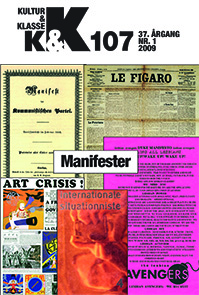Et manifest på dansk må omhandle modersmålet og angribe fædrelandet: Litteraturhistoriske forstudier om kunst og sprog
DOI:
https://doi.org/10.7146/kok.v37i107.22015Nøgleord:
Manifest, dansk, modersmål, angreb, fædrelandet, Litteraturhistoriske, forstudier, kunst, sprogResumé
A Manifesto in Danish has to deal with the Mother tongue and attack the Fatherland: Some preliminary studies about art and language presented from the point of view of the history of literature:
The study follows five lines of reasoning: The first deals with the impossibility of formulating a manifesto in general; the impossibility of advocating the use of violence and on the other hand the impossibility of using dialogue. So the system of prescriptions and promises normally used in a manifesto no longer have sense.
The next line of reasoning concerns the impossibility of presenting fictional preoccupations in the mass media and explaining why literature in Danish has to deal with its contents and form outside the current commentary and celebration hosted by the mass media. In this second line the Vico legacy is introduced to explain a conflict in Danish literature concerning its lack of an epic centre of historical and aesthetical understanding. Benjamin’s defence of the epicity in the work of Brecht is similarly discussed in this second part of the study. The third line of reasoning is presenting some older investigations on Danish prose into this question of what an epic dimension in the residual Danish culture might have been about in the last century. But all the investigations presented failed to get to the point. The point of dissidence was too weak and the point of national-socialism too clever to be manifest: It could easily hide behind the general cover up of theological aesthetics dominating Lutheran Denmark.
So the fourth line of reasoning deals with political theology as a sort of interiorised state of mind in Denmark.
The fifth line of reasoning presents two examples of something radically different and rather excluded in the political culture of Denmark: The Danish Council of Freedom (Danmarks Frihedsråd) during WWII which failed when it came to attacking the collaboration between Danish democracy and the Third Reich; and the Danish School of Writing (Forfatterskolen) which has been attacked by the local establishment since it was born 25 years ago.
Downloads
Publiceret
Citation/Eksport
Nummer
Sektion
Licens
Tidsskriftet følger dansk ophavsret.





